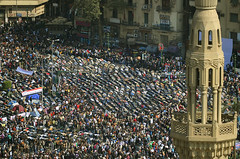
Egyptian masses have risen up against the United States backed regime of Hosni Mubarak. Five people were killed on Feb. 2-3, 2011 while counterrevolutionaries unleashed a reign of terror against the people.
Originally uploaded by Pan-African News Wire File Photos
7 February 2011
Last updated at 23:28 ET
Egypt unrest: New call by protesters to oust Mubarak
The protesters are being squeezed by the authorities
Protesters on Cairo's central Tahrir Square have called for a new push to oust Egyptian President Hosni Mubarak, two weeks into their campaign.
Thousands of people still occupy the square but their lines have been gradually pushed back by the army, keen to get traffic moving again.
Talks have achieved little and there is no sign of Mr Mubarak resigning now.
As normal life resumes around them, the protesters risk sliding into irrelevance, a BBC correspondent says.
To try to escalate the situation on the ground, in order to exert more pressure, would almost certainly risk colliding with the army, the one national institution that is widely respected, Jim Muir reports from Cairo.
That is the dilemma now facing the protesters, made all the more acute by their fear that if they stand down now, they may face retribution from a vengeful establishment, our correspondent says.
On Monday, the government announced a pay rise of 15% for public sector workers - some six million employees. Economic losses caused by the protests are estimated at $310m a day.
Inspired by the success of a similar popular uprising in Tunisia, the protesters have sought to dislodge Mr Mubarak after 30 years in power, blaming him for the country's economic problems and accusing his government of corruption and repression.
Nearly 300 people have been killed across Egypt in the unrest which began on 25 January, according to Human Rights Watch (HRW) researchers.
'Ready to die'
A correspondent for Britain's Guardian newspaper estimated on Monday evening that there were only about 1,000 protesters left in Tahrir Square.
Wrecked vehicles were being removed from Tahrir Square on Monday
The Associated Press news agency reports that the protesters are feeling the strain of camping out, night after night, in the square.
A misty winter drizzle on Saturday made mud of grass areas used to pitch tents.
Food is limited, and scores of the remaining protesters have suffered injuries, with bandaged heads, arms in slings, and crutches a common sight.
Omar Salim, who travelled to Cairo from the northern Sharqiya province and had spent the last four nights sleeping in the square, tried to put a brave face on the miserable conditions.
"The hunger spurs us on," he told AP. "We're in this together, we are all one - that's what keeps us going."
Ahmed Mustafa, a 58-year-old plumber who said his 26-year-old son Islam had been shot dead in front of his eyes on Saturday, said his resolve to see the protest through to the end had only grown.
"This country has no freedom, no plurality of opinion," he said. "What kind of country is it in which a young man of 26 isn't able to marry, to make a family?"
Mr Mustafa said he and his two other adult sons - Karim, 27, and Khaled, 24 - were also ready to pay with their lives to oust the Mubarak government.
"They've come to die like him and I'm ready to go, too," he told AP.
'Branded traitors'
HRW counted 297 victims of the violence, which saw fierce clashes with police, and pitched battles between protesters and Mubarak supporters.
It said it based its count on visits to seven hospitals in the cities of Cairo, Alexandria and Suez. No comprehensive death toll has been given by the Egyptian government.
Wael Ghonim, the Google marketing executive who was behind a Facebook page credited with sparking the demonstrations, was freed on Monday after being detained for 11 days.
He said he had not been ill-treated in custody but was shocked to be branded a traitor.
"Anyone with good intentions is the traitor because being evil is the norm," he told a TV channel.
"If I was a traitor, I would have stayed in my villa in the Emirates and made good money and said, like others, 'Let this country go to hell'. But we are not traitors."

No comments:
Post a Comment